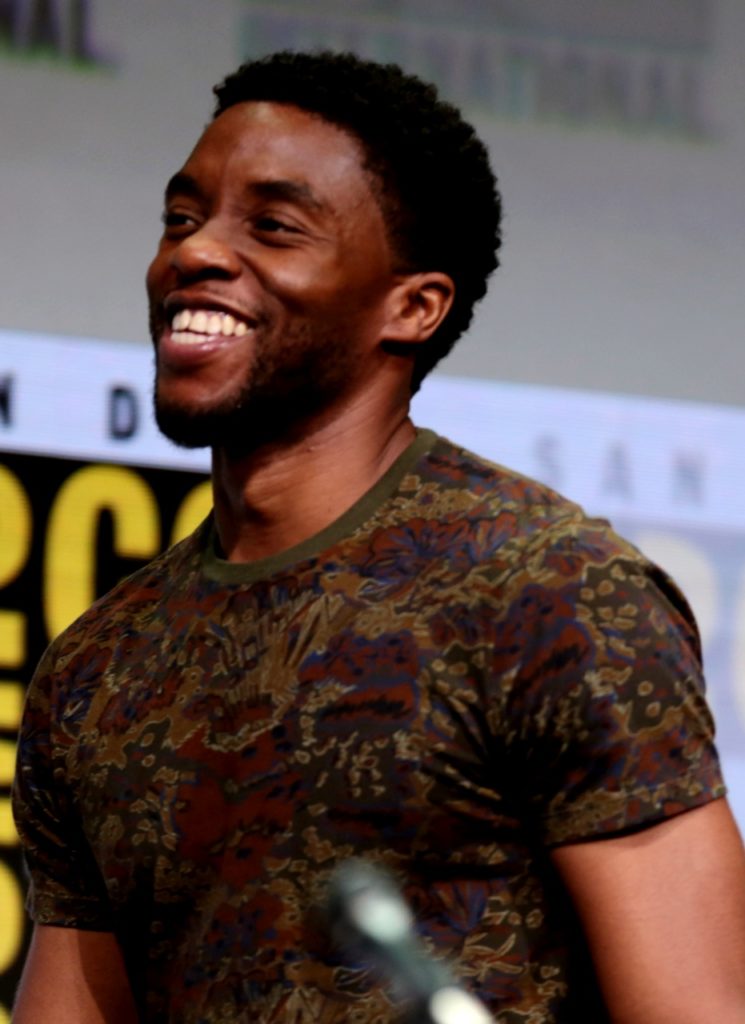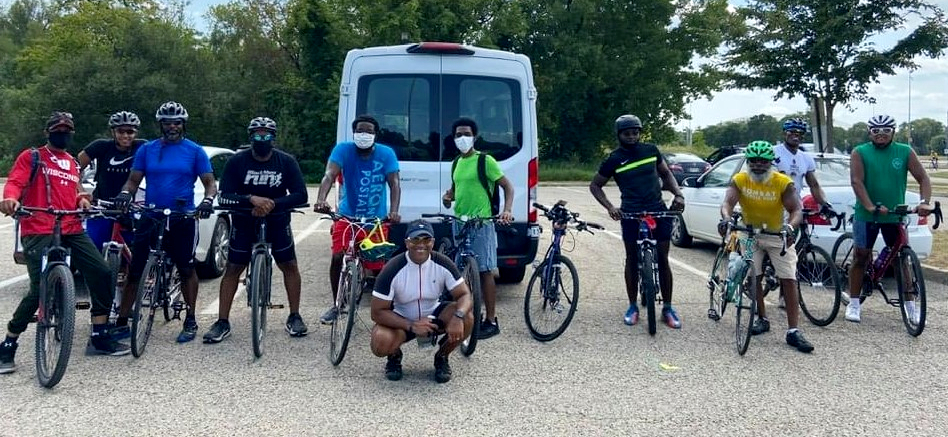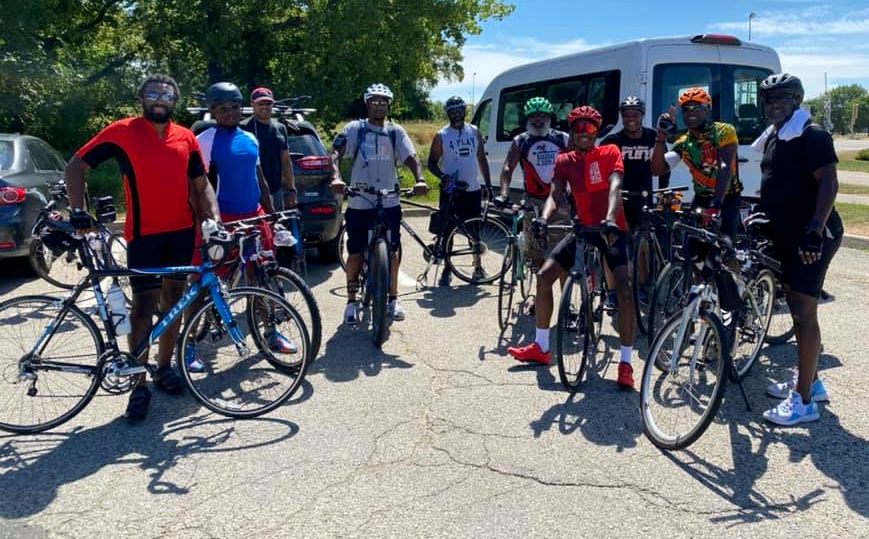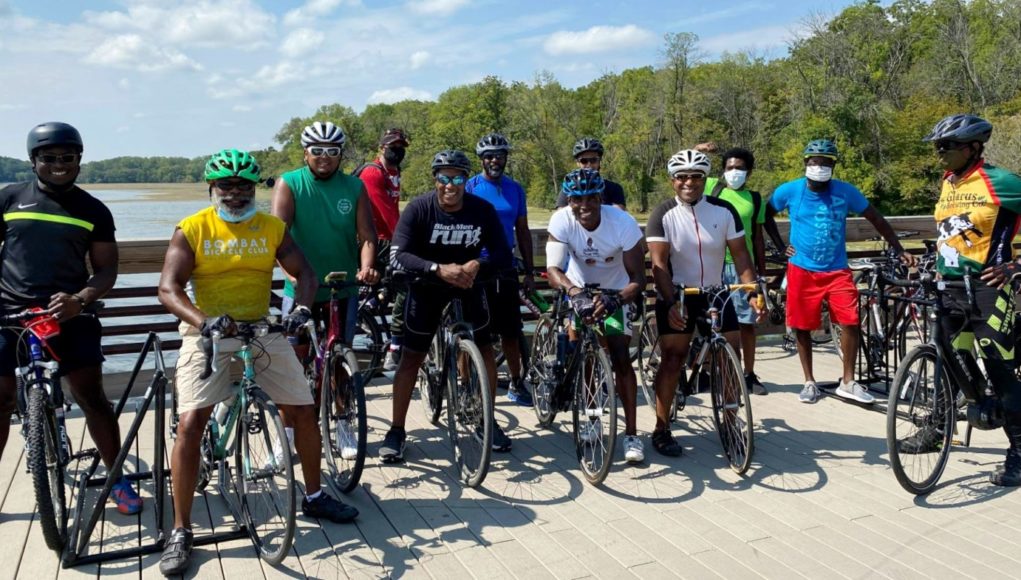Black Men Cycling Madison’s group ride on Sunday was a very special one. The 13 men dedicated their weekly ride to Chadwick Boseman, the iconic “Black Panther” star, who died on Friday at age 43 after a 4-year battle with colon cancer.
“We dedicated that first 4.3 miles to Chadwick Boseman, just in his memory,” Aaron Perry, founder of Rebalanced-Life Wellness Association, tells Madison365. The 4.3 miles were for Boseman’s 43 years on earth. “I think as we looked at this young man, he was such a fit guy and in his movies, he was such a beautiful soul. We saw that play out in all of his movies. He was an immense talent.

“He was living with this immense burden of knowing that he made be dying,” Perry adds. “It’s just incredible strength that this young man displayed in his work.”
Rebalanced-Life Wellness Association started the Black Men Cycling Madison on Aug. 16 to provide Black men with a safer alternative to exercise in a group setting while maintaining social distancing in the COVID-19 era. The group targets Black males age 14-70 and encourages cycling as another tool for maintaining good health while also bringing attention to social causes impacting the life and safety of Black males.
“I thought the rides have been great so far,” Perry says. “Initially, we started the cycling group to support men who may have some challenges with running or maybe just not interested in running and wanted to be outdoors and joining the group exercise element.
“This is the third ride. The first ride we had six guys. The second ride we had 19. On Sunday, we had 13 guys who came out,” he adds.
Black Men Cycling Madison meet every Sunday morning at 11 a.m. in Olin Park across from the Coliseum Bar. Retired Police Officer Fred Conley, 69, leads the group rides of 1-15 miles, and 58-year-old Dino Lucas, who is an Ironman Triathlete, leads the group rides of 15-30 plus miles. All ages come out to ride.
“The youngest in the Black Men Cycling Madison group on Sunday was 14, I believe, and the oldest was 69. It was great to see many generations out. I think that’s important,” Perry says.
Bozeman’s prolific acting career and charisma was on the minds of bikers on Sunday but also the fact that he died at such a young age from colon cancer and that there is a widening racial disparity for colorectal cancer incidence.
“Chadwick had a very close support system because he was diagnosed with stage-3 colon cancer and living with that for four years and no one knew,” Perry says. “Not a single person that did know shared that he was struggling. That is very important.

“Not only was Chadwick such a great actor, in all of his interviews you could see the grace of who he was as a person,” Perry adds. “When I think about someone that would get this dreadful news and in four years he would go on to make so many great movies while being diagnosed with stage-3 colon cancer … that’s an amazing man.
Colorectal cancer is the third most common cancer in both men and women in the United States and the second most common cause of cancer-related death. African Americans bear a disproportionate burden, with an incidence of CRC that is 20 percent higher than in whites and an even larger difference in mortality.
“Survival for colon cancer if caught early can be as high as 80-90 percent, that’s why it’s so important to get screened early,” Perry says.
Some medical professionals say get screened at 50. Some say 45 is the right age for Black men. Boseman was 39 when he was first diagnosed. “We’re reading all of these stories of these young men who are getting colon cancer at a younger age. The medical community has to catch up. We need to have accurate information out here,” Perry says. “You can’t say on one hand, ‘get screened at 50’ and others say ‘get screened at 45’ and then we see African American men get it in their late 30s like Chadwick.
“That’s why I recommend getting screened at the age of 40 or even younger,” he adds. “But I would recommend that at every single appointment that Black men talk about a colorectal exam with their doctor so this won’t be something that if you’re having the symptoms, they get overlooked.”

Black Men Cycling Madison is not only a chance to get some exercise but its also a chance for men to talk about these important health issues that they are sometimes afraid to talk about with other men.
“One of the areas I would like to see us improve in is talking about our illnesses, even if it is just talking about it with our close friends. There is clearly a stigma,” Perry says. “As Black men, it’s sometimes hard to put all of our challenges and our struggles out there.
“As Black men, we do face a number of issues, especially when we’re dealing with racism and depression,” Perry continues. “The reality is that it doesn’t matter now what your financial or economic status is, we’re starting to see highly educated men who are doing well financially are still dealing with racism and depression at an alarming rate.”
As sad as he was about the death of Bozeman this weekend, Perry says that the positive thing was that he got a chance to talk about colorectal cancer and other health issues with other men.
“That was an important takeaway from Sunday,” he says. “Black men need to get screened and they need to talk to their doctor on an ongoing basis about this.”




























